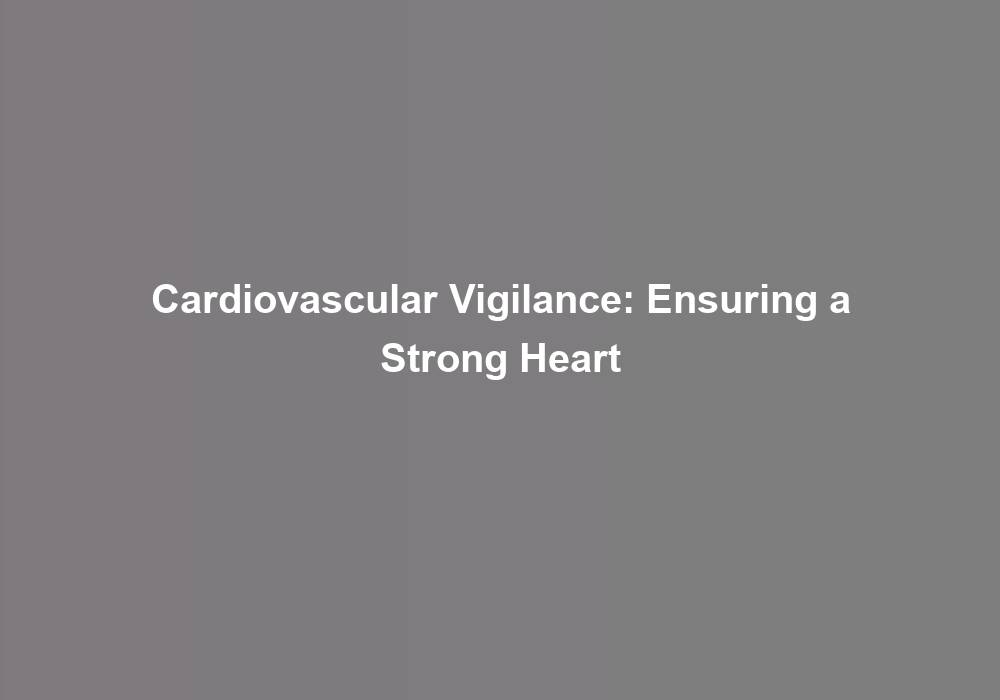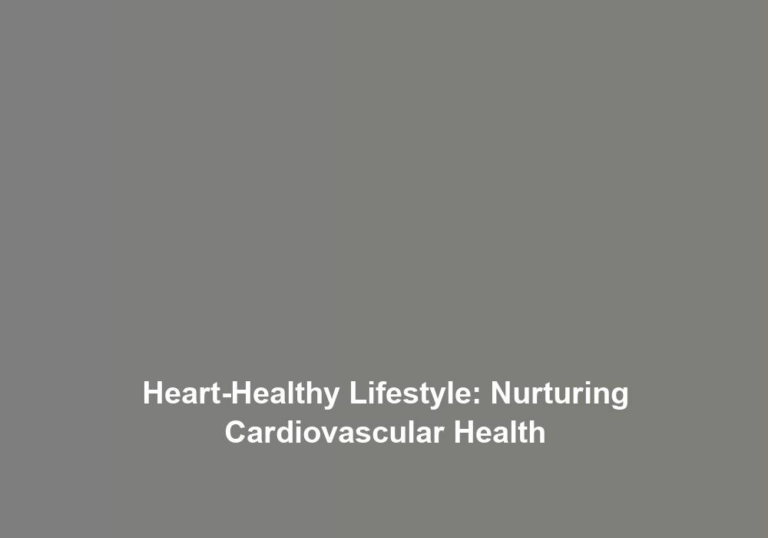Cardiovascular Vigilance: Ensuring a Strong Heart
Ensuring a strong heart requires consistent cardiovascular vigilance. From monitoring your blood pressure to maintaining a balanced diet, there are various ways to support your heart health. But how can you tell if your heart is in top condition? Stay tuned to explore the essential components of cardiovascular vigilance and discover practical strategies for maintaining a robust and resilient heart.
Importance of Cardiovascular Vigilance
To ensure a strong heart, it is crucial to maintain cardiovascular vigilance through regular exercise and a heart-healthy diet. Preventive measures such as these are essential in the early detection and prevention of cardiovascular diseases. Engaging in regular physical activity, such as brisk walking, running, or cycling, helps to strengthen the heart muscle, improve circulation, and maintain healthy blood pressure levels. Additionally, a diet rich in fruits, vegetables, whole grains, and lean proteins, while low in saturated fats and added sugars, plays a significant role in reducing the risk of heart disease.
Early detection of potential cardiovascular issues is equally vital. Regular check-ups with a healthcare provider can help monitor blood pressure, cholesterol levels, and other key indicators of heart health. Furthermore, understanding and recognizing the signs and symptoms of heart problems, such as chest pain, shortness of breath, and irregular heartbeat, empowers individuals to seek medical attention promptly, potentially preventing more serious complications.
Participating in preventive measures and early detection not only supports individual cardiovascular health but also contributes to a sense of belonging within a community of individuals committed to heart-healthy lifestyles. By embracing these measures, you join a collective effort to promote cardiovascular wellness and longevity. This proactive approach fosters a supportive environment where individuals feel connected in their pursuit of strong and healthy hearts.
Exercise and Heart Health
Regular exercise is essential for maintaining a strong and healthy heart, as it helps to strengthen the heart muscle, improve circulation, and regulate blood pressure levels. When it comes to exercise and heart health, itG??s crucial to focus on activities that boost aerobic fitness and promote heart-healthy workouts. Here are key factors to consider:
-
Aerobic Fitness: Engaging in regular aerobic exercise, such as brisk walking, running, cycling, or swimming, is vital for enhancing cardiovascular endurance. Aerobic activities increase your heart rate and breathing, improving the efficiency of oxygen delivery to your muscles and organs. Aim for at least 150 minutes of moderate-intensity aerobic exercise per week to reap the full cardiovascular benefits.
-
Heart-Healthy Workouts: Incorporating strength training into your fitness regimen not only builds muscle but also supports heart health. Resistance exercises, such as weightlifting or bodyweight workouts, contribute to better heart function by reducing the workload on the heart and improving overall muscle tone. Additionally, yoga and Pilates can help reduce stress and promote relaxation, which are beneficial for heart health.
-
Interval Training: High-intensity interval training (HIIT) alternates short bursts of intense exercise with periods of rest or lower-intensity activity. This form of exercise has been shown to improve cardiovascular health, increase aerobic capacity, and enhance overall heart function.
-
Consistency and Variety: Consistently engaging in a variety of exercises is key to maintaining a healthy heart. Mixing up your workouts helps prevent boredom, reduces the risk of overuse injuries, and ensures that different muscle groups are targeted, leading to a well-rounded approach to heart health.
Dietary Factors for a Strong Heart
Opt for a balanced diet rich in fruits, vegetables, whole grains, lean proteins, and healthy fats to support optimal heart function and overall cardiovascular health. Nutritional balance is crucial for maintaining a healthy heart. Consuming heart-healthy foods such as leafy greens, berries, nuts, fatty fish, and olive oil can significantly impact your heart health.
Fruits and vegetables provide essential vitamins, minerals, and antioxidants, which play a vital role in maintaining cardiovascular health. Whole grains like oats, quinoa, and brown rice are rich in fiber, which helps lower cholesterol levels and reduce the risk of heart disease. Lean proteins such as chicken, turkey, and legumes are excellent sources of protein without the added saturated fats found in red meats. Additionally, healthy fats from sources like avocados, nuts, and seeds can help reduce bad cholesterol levels and lower the risk of heart disease.
A diet focused on these heart-healthy foods not only supports cardiovascular health but also contributes to overall well-being. It is essential to limit the intake of processed foods, sugary beverages, and foods high in trans fats and sodium as these can increase the risk of heart disease. By making conscious choices and opting for a diet rich in nutrient-dense, heart-healthy foods, you can significantly impact your heart health and reduce the risk of cardiovascular issues. Remember, your heart health is in your hands, and your dietary choices play a crucial role in ensuring its strength and vitality.
Stress Management and Heart Health
Managing stress effectively is crucial for maintaining optimal heart health and reducing the risk of cardiovascular issues. Mental wellness plays a pivotal role in this, and implementing relaxation techniques can significantly contribute to your overall well-being and heart health. Here are some evidence-based strategies to help you manage stress and support your heart health:
- Mindfulness Meditation: Engaging in regular mindfulness meditation has been shown to reduce stress, lower blood pressure, and improve overall heart health.
- Deep Breathing Exercises: Practicing deep breathing exercises can help calm your nervous system, reduce stress hormones, and promote relaxation, thereby benefiting your heart health.
- Yoga: Incorporating yoga into your routine can not only enhance flexibility and strength but also have a positive impact on your mental well-being, potentially reducing stress and benefiting your heart.
- Progressive Muscle Relaxation: This technique involves tensing and relaxing each muscle group in your body to alleviate physical tension and mental stress, ultimately supporting your heart health.
Monitoring Heart Health at Home
To effectively monitor your heart health at home, consider utilizing reliable and validated devices for tracking key indicators such as blood pressure, heart rate, and physical activity levels. Home monitoring of these vital signs can provide valuable insights into your cardiovascular well-being and help in early detection of potential issues. When it comes to blood pressure monitoring, automatic digital monitors are widely recommended for ease of use and accuracy. These devices can track your blood pressure over time and provide a clear picture of your heartG??s workload and the health of your arteries. Additionally, monitoring heart rate variability (HRV) can offer valuable information about your overall heart health and stress levels. Specialized HRV monitoring devices are available for home use, enabling you to track changes in your heartG??s rhythm and autonomic nervous system function.
Engaging in regular self-care practices is also essential for monitoring heart health at home. This includes maintaining a healthy diet, engaging in regular physical activity, and managing stress levels through relaxation techniques or mindfulness exercises. ItG??s important to note that home monitoring should be complemented by regular check-ups with a healthcare professional to ensure comprehensive cardiovascular care. By incorporating these practices into your routine, you can take an active role in safeguarding your heart health and fostering a sense of empowerment and control over your well-being.
Conclusion
In conclusion, maintaining cardiovascular vigilance is crucial for a strong heart. Did you know that regular physical activity can reduce the risk of heart disease by 30%? By exercising, eating a heart-healthy diet, managing stress, and monitoring your heart health at home, you can ensure the longevity and vitality of your most important muscle. Stay vigilant and prioritize your heart health to live a long and healthy life.







